Books by Liviu Iulian Cocei
DESPRE FERICIRE, 2022
Contradictoriu, căci, totodată, simplist și totuși mult
mai lipsit de finalitate practică decât s... more Contradictoriu, căci, totodată, simplist și totuși mult
mai lipsit de finalitate practică decât se crede stereotip
despre tratatele de etică filosofică, discursul public de
main-stream abordează fericirea ca pe o problemă de posesie a unor lucruri exterioare, așa-zis „obiective”: bani,
proprietăți, carieră, faimă, viață erotică, succes, putere.
Mitul obiectivității și cuantificabilității nu este deloc
nou dar nici ușor de înlăturat căci, cel puțin atunci
când este suprapus peste problema opțiunilor în viață,
el servește grozav de bine justificării rapide a comodităților și adicțiilor noastre cele mai perfide. Așa încât,
oricât ne-am dori uneori să fim lăsați în pace, nu e deloc
liniștitor gândul că fericirea ar fi același lucru cu acumularea de lucruri materiale, statut social sau chiar –
cum ne eschivăm uneori – cu sănătatea.
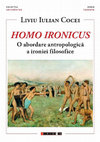
„Subiectul, dovedit a fi unul extrem de dificil, a impus autorului abordarea conceptului de iron... more „Subiectul, dovedit a fi unul extrem de dificil, a impus autorului abordarea conceptului de ironie într-o manieră ramificată: antropologică și istorică, în spiritul unei filosofii a culturii, ce se deschide spre perspectivele unor metode de cercetare marcate de un puternic spirit critic. Ironia filosofică ridică discursul tezei la nivelul în care se impune deja jocul abstracțiilor. După o inspirată catalogare a principalelor tipuri de ironie filosofică, Liviu I. Cocei lansează o strategie de cercetare pe care o apreciem ca extrem de provocatoare. Se constată faptul că ironia, în formele ei filosofice, însoțește mai ales momentele de cumpănă, de tranziție ale istoriei, fiind principalul ingredient al revoluțiilor politice, estetice, etice, religioase sau de altă natură. Beneficiind de o arhitectonică inginerească în elaborarea temelor și subtemelor, lucrarea se caracterizează printr-o documentație cuprinzătoare, originalitate, și mai ales claritate în abordarea conceptului tratat. Partea de originalitate a tezei constă în abordarea holistă, din perspectiva istoriei filosofiei, a ironiei pe care o corelează cu cinismul, așa cum se dezvoltă el în Antichitate prin discipolii lui Socrate. Domnul Cocei a căutat să identifice corelația dintre ironie, ca un element extrem de important al unui tip de metodă critică, și manifestările spirituale în al căror tip de expresie se poate regăsi filosofia cinică.” Prof.univ.dr. Marius Dumitrescu
Papers by Liviu Iulian Cocei
Danubius, 2018
-Whithin this paper I will try to write a lot about a little, regarding the relationship between ... more -Whithin this paper I will try to write a lot about a little, regarding the relationship between irony and power. Thus, I will reveal the anthropological dimension of irony, namely the way the power of the thought-that-is-hiding works. By analyzing the connection between irony and power, a new key word will emerge, namely the distance, which occurs in any relationship based on irony, and also the ontological distance between the field of human beings and the divine realm. In both cases, irony seems to have a special kind of power, mostly subversive, which can be found not only in art and literature, but also in politics, philosophy or theology.
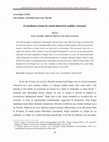
Irony's fecundity within the dialectics of the stages of existence The following paper is dedicat... more Irony's fecundity within the dialectics of the stages of existence The following paper is dedicated to Kierkegaard`s life and work, in the light of the stages of existence that he conceived. Since he is one of the philosophers whose writings are bound together with his personal life, I intend to study him as a whole, both as an ironist and as an ironologist. The main goal of this text is to analyze the function of the concept of irony that helped Kierkegaard to overcome his personal problems, especially his broken engagement to Regine Olsen. If, in his dissertation on irony, the Danish philosopher reffers permanently to Socrates, in the following books he is constantly reffering to Regine. Finally, I argue that the entire game of pseudonyms that he orchestrated was part of his plan to make the leap of faith. Even though his love for Regine was, in a way, a disaster, in other sense of understanding was a good thing, because it forced him to reach out and touch faith, giving us a way of life.
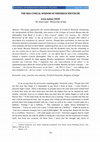
This paper approaches the twisted philosophy of Friedrich Nietzsche considering
the interpretati... more This paper approaches the twisted philosophy of Friedrich Nietzsche considering
the interpretation of Peter Sloterdijk, who asserts in his Critique of Cynical Reason that the
philosopher from Basel is in fact a Neo-„Cynical” thinker. For instance, the „Eternal
Recurrence of the Same” is one of Nietzsche’s most subversive thoughts that reflects a
description of a resurgence of „kynical” motives. Though often overlooked, we must say that
Nietzsche himself occasionally practiced Cynicism as a strategy of survival. We know that he
lived modestly and had no fixed abode, wandering from city to city with all his notes and just
a few books. Because Nietzsche rejected not only the Academic style, but the citizenship in
any one country just as much as Diogenes had protested against Plato’s philosophy and had
declared himself a „citizen of the world”, we can affirm that he was a true cosmopolitan,
namely a modern Cynical philosopher. That is why, before his mental breakdown, he
ostentatiously stylized his fight against Western metaphysics, Christianity and Christian
morality into Cynicism. Thus, I emphasize that „the transvaluation of all values” is an
unfinished project about the virtues of Neo-cynical wisdom. Besides, his basic concepts – „the
Overman”, „the Eternal Recurrence of the Same”, „the Will to Power” – are nothing more
than metaphors for „the love of fate” or for the acceptance of the idea of Becoming.

The phrase ”Socratic irony”, which is principally used with reference to Socrates` philosophical ... more The phrase ”Socratic irony”, which is principally used with reference to Socrates` philosophical method, is one of the biggest unsolved puzzles of Greek philosophy. Since the beginning of its occurrence, this type of irony has been a fertile ground for the abuse of exegetical tradition. But, despite the mysteries that surrounds the image of Socratic dissembling, it seems that the questioning technique of Socrates had a valuable influence on the entire Western thought. In this paper I discuss some types of comprehending and interpreting the specific irony that Socrates used in his provocative discussions. In this way, the present study starts with the analysis of the mistaken interpretation of the Sophists and continues with an inquiry of understanding how the concept of irony evolved from Antiquity to Friedrich Nietzsche. At the same time I will reveal the ethical issues involved in using the complex Socratic irony.

The analysis of the ethical implications concerning the use of irony is not an easy task. Even th... more The analysis of the ethical implications concerning the use of irony is not an easy task. Even though there are notable differences between the various ironical expressions, it looks like irony in general plays with people’s emotions. Ironically, it seems that it gets them together and pulls them apart at the same time. Thus, whether we refer to philosophical or rhetorical irony, it is hard to say when is it morally right to turn into ridicule. Therefore, in this paper, considering Linda Hutcheon`s view on the edge of irony and Richard Rorty`s neo-pragmatist philosophy, we analyze the moral limits of ironization. We emphasize that, in some cases, the difference between the use and the abuse of irony is cancelled, the limit between innocent irony and real offence being almost inexistent. For this reason, we claim that irony is acceptable only in a culture that is opened to all ironic modalities, such as satire, parody, caricature, pamphlet and even humor.
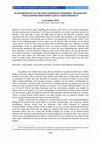
In the current study, regarding the analysis of the more or less obvious opposition between playi... more In the current study, regarding the analysis of the more or less obvious opposition between playing and seriousness, I will focus my attention on a ludic expression specific to humans. I am referring to irony, the edgy figure of speech and derision of matters often considered the most serious. Beyond the sense of everyday understanding, I will especially be referring to Socratic irony and the way in which it was interpreted. As a matter of fact, I will delve in the ambiguous game of irony, where we will discover that, inevitably, we are faced with a choice: to take or not to take seriously what is communicated to us. Whether it`s about commonplace irony or philosophical irony, we always oscillate between ignoring and believing the statements that reach our ears or meet our eyes. Regarding this, among other ludic elements, I will also analyze writing as a part of the ironic spirit, with special reference to Friedrich Nietzsche, a philosopher who developed the art of aphoristic essay. On the other hand, the entire matter will orbit these issues: What are the consequences of interpreting irony? In other words: When should irony be taken seriously, and in which way, but more importantly, when should not be taken seriously at all?
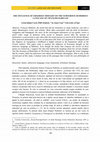
Franҫois Rabelais, the monk that left the monastery to study medicine, was also a major Renaissan... more Franҫois Rabelais, the monk that left the monastery to study medicine, was also a major Renaissance writer and scholar. Most often associated with the field of literature, Gargantua and Pantagruel, the story of the extravagant adventures of two giants, covers a much wider range of domains: from occult or fantastic stories (like the episode of Epistemon`s resurrection) to epic tales (like the naval journey in search of the Divine Bottle), from practical philosophy to the art of education (the letter of Gargantua to Pantagruel and the chapters on Gargantua`s childhood is highly relevant to the humanistic ideals of the French author). This paper aims to analyze the influence of Erasmian thought on the hilarious language of Rabelais. Even though the books that compose the stories of these giants are humorous, I support the idea that behind the laughing mask lies serious thoghts. Just like Erasmus of Rotterdam in The Praise of Folly, Rabelais, through the ironic language that he creates, hides his subversive view about the Scholastic theologians. That is why, in the second part of this study, I analyze some of the passages that reveals his own philosophy of life.
The study debates the daring approaches of Dante Aligheri and Francesco Petrarch against the lim... more The study debates the daring approaches of Dante Aligheri and Francesco Petrarch against the limitations of their own time. While Dante`s works reflects the end of the Middle Ages, Petrarch`s writings represents the dawn of the Renaissance thought. Despite all the differences between them, both poets fought against the ignorance and the corruption of the scholastic theologians. I emphasize that, through Dante and Petrarch, philosophy emerges as a secular discipline, even though they didn`t create a solid ground for the development of systematic philosophy.
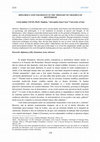
"Diplomacy and Tolerance in the Thought of Erasmus of Rotterdam", in: Iulian Boldea (coord.), "Communication, Context, Interdisciplinarity: Studies and Articles", Vol. III, Section: History, „Petru Maior” University Press, Târgu-Mureş, 2014, pp. 539-545 Diplomacy is a technique that covers various fields: from history and international relations
to... more Diplomacy is a technique that covers various fields: from history and international relations
to psychology and philosophy. It is the landmark of freedom of speech and thought. In the
Renaissance, when religious censorship banned many books on the grounds of blasphemy, heresy, or
impiety, the risk of being banned or even burned at the stake was very big. In this circumstances, very
few scholars achieved to express their thoughts without being punished. Amongst humanists, Erasmus
of Rotterdam, a Dutch scholar, has been an example of teacher and social critic, mostly because of his
subversives techniques of writing. Also, the fact that, despite he was so ironic with the abuses of the
Catholic Curch, he kept his distance from Luther`s Reformation, has been a proof of his independent
mind and profound wisdom. The main goal of this paper is to reveal the symptomatic middle way that
Erasmus emphasized in his work through the looking glass of irony, especially in The Praise of Folly.









Uploads
Books by Liviu Iulian Cocei
mai lipsit de finalitate practică decât se crede stereotip
despre tratatele de etică filosofică, discursul public de
main-stream abordează fericirea ca pe o problemă de posesie a unor lucruri exterioare, așa-zis „obiective”: bani,
proprietăți, carieră, faimă, viață erotică, succes, putere.
Mitul obiectivității și cuantificabilității nu este deloc
nou dar nici ușor de înlăturat căci, cel puțin atunci
când este suprapus peste problema opțiunilor în viață,
el servește grozav de bine justificării rapide a comodităților și adicțiilor noastre cele mai perfide. Așa încât,
oricât ne-am dori uneori să fim lăsați în pace, nu e deloc
liniștitor gândul că fericirea ar fi același lucru cu acumularea de lucruri materiale, statut social sau chiar –
cum ne eschivăm uneori – cu sănătatea.
Papers by Liviu Iulian Cocei
the interpretation of Peter Sloterdijk, who asserts in his Critique of Cynical Reason that the
philosopher from Basel is in fact a Neo-„Cynical” thinker. For instance, the „Eternal
Recurrence of the Same” is one of Nietzsche’s most subversive thoughts that reflects a
description of a resurgence of „kynical” motives. Though often overlooked, we must say that
Nietzsche himself occasionally practiced Cynicism as a strategy of survival. We know that he
lived modestly and had no fixed abode, wandering from city to city with all his notes and just
a few books. Because Nietzsche rejected not only the Academic style, but the citizenship in
any one country just as much as Diogenes had protested against Plato’s philosophy and had
declared himself a „citizen of the world”, we can affirm that he was a true cosmopolitan,
namely a modern Cynical philosopher. That is why, before his mental breakdown, he
ostentatiously stylized his fight against Western metaphysics, Christianity and Christian
morality into Cynicism. Thus, I emphasize that „the transvaluation of all values” is an
unfinished project about the virtues of Neo-cynical wisdom. Besides, his basic concepts – „the
Overman”, „the Eternal Recurrence of the Same”, „the Will to Power” – are nothing more
than metaphors for „the love of fate” or for the acceptance of the idea of Becoming.
to psychology and philosophy. It is the landmark of freedom of speech and thought. In the
Renaissance, when religious censorship banned many books on the grounds of blasphemy, heresy, or
impiety, the risk of being banned or even burned at the stake was very big. In this circumstances, very
few scholars achieved to express their thoughts without being punished. Amongst humanists, Erasmus
of Rotterdam, a Dutch scholar, has been an example of teacher and social critic, mostly because of his
subversives techniques of writing. Also, the fact that, despite he was so ironic with the abuses of the
Catholic Curch, he kept his distance from Luther`s Reformation, has been a proof of his independent
mind and profound wisdom. The main goal of this paper is to reveal the symptomatic middle way that
Erasmus emphasized in his work through the looking glass of irony, especially in The Praise of Folly.
mai lipsit de finalitate practică decât se crede stereotip
despre tratatele de etică filosofică, discursul public de
main-stream abordează fericirea ca pe o problemă de posesie a unor lucruri exterioare, așa-zis „obiective”: bani,
proprietăți, carieră, faimă, viață erotică, succes, putere.
Mitul obiectivității și cuantificabilității nu este deloc
nou dar nici ușor de înlăturat căci, cel puțin atunci
când este suprapus peste problema opțiunilor în viață,
el servește grozav de bine justificării rapide a comodităților și adicțiilor noastre cele mai perfide. Așa încât,
oricât ne-am dori uneori să fim lăsați în pace, nu e deloc
liniștitor gândul că fericirea ar fi același lucru cu acumularea de lucruri materiale, statut social sau chiar –
cum ne eschivăm uneori – cu sănătatea.
the interpretation of Peter Sloterdijk, who asserts in his Critique of Cynical Reason that the
philosopher from Basel is in fact a Neo-„Cynical” thinker. For instance, the „Eternal
Recurrence of the Same” is one of Nietzsche’s most subversive thoughts that reflects a
description of a resurgence of „kynical” motives. Though often overlooked, we must say that
Nietzsche himself occasionally practiced Cynicism as a strategy of survival. We know that he
lived modestly and had no fixed abode, wandering from city to city with all his notes and just
a few books. Because Nietzsche rejected not only the Academic style, but the citizenship in
any one country just as much as Diogenes had protested against Plato’s philosophy and had
declared himself a „citizen of the world”, we can affirm that he was a true cosmopolitan,
namely a modern Cynical philosopher. That is why, before his mental breakdown, he
ostentatiously stylized his fight against Western metaphysics, Christianity and Christian
morality into Cynicism. Thus, I emphasize that „the transvaluation of all values” is an
unfinished project about the virtues of Neo-cynical wisdom. Besides, his basic concepts – „the
Overman”, „the Eternal Recurrence of the Same”, „the Will to Power” – are nothing more
than metaphors for „the love of fate” or for the acceptance of the idea of Becoming.
to psychology and philosophy. It is the landmark of freedom of speech and thought. In the
Renaissance, when religious censorship banned many books on the grounds of blasphemy, heresy, or
impiety, the risk of being banned or even burned at the stake was very big. In this circumstances, very
few scholars achieved to express their thoughts without being punished. Amongst humanists, Erasmus
of Rotterdam, a Dutch scholar, has been an example of teacher and social critic, mostly because of his
subversives techniques of writing. Also, the fact that, despite he was so ironic with the abuses of the
Catholic Curch, he kept his distance from Luther`s Reformation, has been a proof of his independent
mind and profound wisdom. The main goal of this paper is to reveal the symptomatic middle way that
Erasmus emphasized in his work through the looking glass of irony, especially in The Praise of Folly.